The Somerset Newsflash, December 2022
Important Dates
- December 31, 2022: Deadline to apply for a Maine Produce Safety Improvement Grant
- December 31, 2022: Deadline to apply for the Maine Soil Health Project
- December 31, 2022: Deadline to re-enroll in 4-H
- December 31, 2022: Last day to complete survey for Maine Agriculture Resilience Research
- January 10, 2023: UMaine Livestock and Forage Session at the Maine Ag Trade Show
- January 10-12, 2023: Maine Agricultural Trades Show
- January 11, 2023: Maine Beef Association Education Program and Annual Meeting
- January 12-March 2, 2023: GenerationNext Virtual Seminar Begins
- February 1, 2023: Somerset Extension Executive Board Meeting
- February 2, 2023: Application Deadline for Dairy Farm Innovation Grant
- May 6, 2023: Somerset Extension OPEN HOUSE!
Contents
The News in the County
Save the Date! We’re hosting an OPEN HOUSE!!
Mark your calendars for Saturday, May 6, 2023 (with a rain date of May 13). Our Somerset County Extension staff and board members will be hosting an Open House and all community members are invited. Please help us spread the word! More details to come in our next issue of The Somerset Newsflash.
We Are Hiring!!
The Administrative Specialist CL2 with the University of Maine Cooperative Extension’s Somerset County Office is responsible for bookkeeping, clerical, and office tasks in support of the faculty, staff, and volunteers conducting educational programming, research, and/or outreach. This is a part-time, 20 hours per week, within normal UMaine Cooperative Extension office hours, 8:00 a.m. to 4:30 p.m.
Please help us spread the word about this opportunity! If you know someone who may be interested in this position, please refer them to the position description on the UMaine job site.
Brett’s Bulletin: Issues Impacting Somerset’s Farms & Gardens
Brett Johnson is our Sustainable Agriculture and Horticulture Professional and develops educational programs and provides technical assistance to commercial agricultural producers, and home gardeners, and community members.
Taking care of indoor plants during the winter requires careful observation
Different plant species have different needs, and this reality is perhaps most appreciated during the winter months when conditions are less conducive to general plant health. Typical indoor conditions in the winter include relatively dry air (<50% RH), cooler temperatures (60 to 70F), less light (<10 hrs per day), and indoor availability of direct light that differs from other seasons due to the position of the sun. In the winter direct sunlight may penetrate further into rooms and provide more hours of direct sunlight to a plant than the same location receives in the summer time. Rooms with southern and western exposures usually provide the greatest amount of sunlight and radiant heat. Plants placed in these locations will usually show the greatest need for water in the winter months, especially if relative humidity is kept low (10-20% RH). Testing moisture weekly using a soil moisture meter is advisable to ensure that overwatering is not taking place. Increasing relative humidity can decrease the frequency of watering and improve overall plant health. Most indoor plants do not tolerate nighttime temperatures below 65F. Take care to keep houseplants away from areas where temperatures may fluctuate due to draft or hot air discharge. Lastly, for success get to know the light, temperature, humidity, water, and nutrition requirements of your plants and adjust their environment accordingly. Happy holidays!
Alice’s Adventures: EFNEP Updates for the Month of December
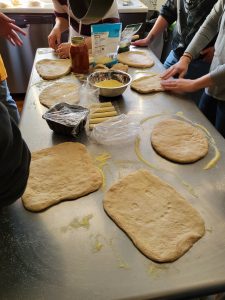 Alice Cantrell is our Nutrition Community Education Assistant and leads classes as part of Cooperative Extension’s Expanded Food and Nutrition Education Program (EFNEP).
Alice Cantrell is our Nutrition Community Education Assistant and leads classes as part of Cooperative Extension’s Expanded Food and Nutrition Education Program (EFNEP).
This month, Alice is finishing up her current youth programs at Bloomfield Elementary, Margaret Chase Smith School, and the Skowhegan Area Middle School.
Alice also recently finished her adult programming at El Rancho De La Vida in Fairfield and at the McAuley Residence in Bangor. Both adult series ended with a special guest visit from Nick Rimsa, who works with The Good Crust pizza dough company. Nick shared some pizza dough and participants learned about how it is made locally with Maine Grains. Then everyone got to make and enjoy their own pizza!
Alice also wants to let you know that EFNEP is hiring! They are looking for applicants with a high school diploma or equivalent who have an interest in teaching youth and adults. To apply and see more information, visit the EFNEP website.
The News in Agriculture
82nd Annual Maine Agricultural Trades Show
The show returns to the Augusta Civic Center and aims to meet farmer demand for learning, planning, and networking.
The Department of Agriculture, Conservation and Forestry’s (DACF) Agricultural Trades Show, the state’s largest farmer-focused event, returns to the Augusta Civic Center on January 10-12, 2023. This year’s event is the first in-person gathering since 2019. The previous two years featured exclusively online attendee experiences. DACF’s Agricultural Resource Development Division is the show organizer and announced plans for the 2023 edition.
Show dates and location:
- Tuesday, January 10, 2023 – 9 a.m. to 5 p.m.
- Wednesday, January 11, 2023 – 9 a.m. to 6 p.m.
- Thursday, January 12, 2023 – 9 a.m. to 3 p.m.
- At the Augusta Civic Center, 76 Community Drive, Augusta, ME 04330
Save the Date: UMaine Livestock and Forage Session at the Maine Ag Trade Show
Our team will be sharing information at the Maine Agricultural trade show on Tuesday, January 10. Be sure to sit in our sessions discussing livestock and forage research and general knowledge.
Visit Maine Agricultural Trades Show webpage for more updates.
Maine Beef Association Education Program and Annual Meeting at the Ag Trades Show
Wednesday, January 11 at the Civic Center in Augusta
- Noon: Cooking Demonstration with Chef Rob and Colt Knight – Presentation Stage
- 1 pm: Beef Education Program
-
- Watch for the special email with the program agenda
- 3 pm: Maine Beef Association Annual Meeting
-
- Awards Presentation
- Elections
Stop by the MBPA Information Booth on the Trade Show Floor all three days.
SARE Publishes New Guide to Scaling Up Your Vegetable Farm for Wholesale Markets
This bulletin is intended to introduce interested small and mid-sized direct market farmers to the many business and production related considerations that come with growing for wholesale markets. Specific topics include clarifying goals, assessing your farm operations readiness to scale up, and characteristics of wholesale markets.
Accepting Maine Produce Safety Improvement Grants
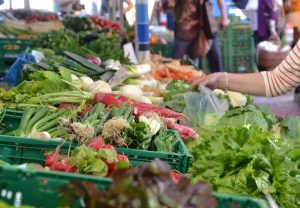 The Maine Produce Safety Improvement Grants (MPSIG) is designed to help any specialty crop growers i.e, growers of fruits and vegetables, tree nuts, dried fruits, horticulture, and nursery crops to:
The Maine Produce Safety Improvement Grants (MPSIG) is designed to help any specialty crop growers i.e, growers of fruits and vegetables, tree nuts, dried fruits, horticulture, and nursery crops to:
- Implement on-farm food safety practices;
- Transition to compliance with the Food Safety Modernization Act (FSMA) Produce Safety Rule (PSR);
- Meet market demands for on-farm food safety.
Eligibility:
Proposed projects are restricted to improving the food safety of specialty crops. We will be awarding grants up to $10,000 to 15 farms. Prior awardees are not eligible.
Allowed Project Investments:
- Plastic Harvest Totes
- Stainless Steel Handwashing Sinks
- Small Greens Bubblers
- Salad Spinners
- Stainless Steel Tables and Carts
The application deadline is December 31. See more information and apply here.
Maine Soil Health Project Applications Deadline Extended
In partnership with the Department of Agriculture, Conservation and Forestry, University of Maine Cooperative Extension, and the Maine Organic Farmer and Gardeners Association, grants of up to $5,000 will be awarded to 17 farmers for the purpose of reimbursing approved expenses for improving soil health. Technical assistance will also be provided for participants to develop soil health improvement plans, magnifying the impact of the direct investment.
This grant is designed to help specialty crop growers i.e, growers of fruits and vegetables, tree nuts, dried fruits, horticulture, and nursery crops (including floriculture but excluding commodity crops) to implement healthy soil practices. Applications are due December 31. See more details and apply on the Maine Soil Health Project webpage.
Free Testing for High Tunnel Soilborne Diseases
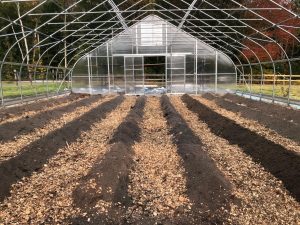 If you grow high tunnel veggies and have been experiencing disease issues or are wondering if there are soilborne pathogens present, here’s an opportunity to find out for free. Samples are wanted for a multi-state USDA funded project on soilborne diseases occurring in high tunnel vegetable crops. It will be valuable to find out what pathogens are present in our region, and how the situation here compares to other regions. Anna Testen is accepting samples this fall through February 2023.
If you grow high tunnel veggies and have been experiencing disease issues or are wondering if there are soilborne pathogens present, here’s an opportunity to find out for free. Samples are wanted for a multi-state USDA funded project on soilborne diseases occurring in high tunnel vegetable crops. It will be valuable to find out what pathogens are present in our region, and how the situation here compares to other regions. Anna Testen is accepting samples this fall through February 2023.
If you have questions or would like to participate, please contact Anna directly at Anna.Testen@usda.gov or 330-641-2862.
Integrating Grazing into Cropping Systems: Grazing Cover Crops for Soil Health
Fact sheet on grazing cover crops for soil health. Part of the integrated grazing fact sheet series.
For a long time, the tendency in modern farming has been to specialize, resulting in grazing animals being excluded from cropland. However, there is a new appreciation for the potential benefits of grazing animals for soil, crops, and farmers. By bringing the grazing animal back on the land we are in a way mimicking nature. Cover crops have been promoted to help improve soil health and reduce soil erosion and nutrient losses from cropland. They cover the land that would otherwise be sitting idle, again mimicking nature. Those cover crops can also be eaten by grazing animals, improving the financial bottom line of the farm. If done right, grazing cover crops can also help improve soil while maintaining the environmental benefits of the cover crops. If done wrong, however, grazing cover crops can become an environmental liability that can degrade soil. The key is proper cover crop and grazing management. This fact sheet from PennState Extension discusses management strategies to optimize the soil health benefits of grazing cover crops, while avoiding soil erosion, detrimental soil compaction, and nutrient runoff.
Dairy Farm Innovation Grant
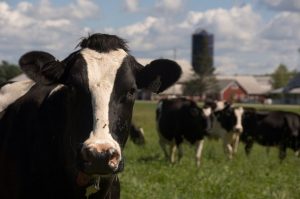 Northeast Dairy Business Innovation Center (NE-DBIC)
Northeast Dairy Business Innovation Center (NE-DBIC)
This program will provide grants for dairy farmers to access resources and technical assistance to support the implementation of community- and climate-forward production strategies.
Projects funded through this grant program should take a whole farm system approach and increase collaboration with other farms or dairy sector stakeholders.
Projects may address improvements in topics such as, but are in no way limited to: switching breeds, creating new models for collaborative/cooperative milk production, increased young farmer engagement, alternative business ownership/management models, development of green technologies, farm-scale appropriate technology improvements, or creating a culture of continuous improvement.
Grants will range from $10,000 to $75,000 with a 25% (cash or in-kind) match commitment required.
Application opens: November 1, 2022
Application deadline: February 2, 2023
For more information, visit the Dairy farm Innovation Grant webpage.
New Dairy Forage Educator Jaime Garzon
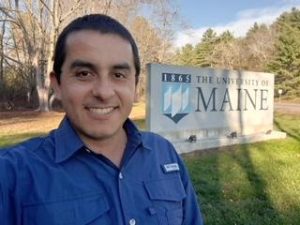 Originally from Bogota (Colombia), Dr. Jaime Garzon graduated as Zootechnician (B.S. in Animal Sciences) and got a master’s degree in Animal Production at the Universidad Nacional de Colombia. His research project evaluated the performance of cool and warm-season forages and greenhouse gas emissions from agriculture. During that time, Dr. Garzon also participated in two internships at the Instituto Nacional de Investigacion Agropecuaria (Uruguay), and the UF North Florida Research and Education Center (Marianna, FL), working with pastures, rangelands, and livestock management. In 2018, Dr. Garzon was awarded the Fulbright-ICETEX Pasaporte a la Ciencia scholarship, which allowed him to start his Ph.D. in Agronomy at the University of Florida. His dissertation evaluated the ecosystem services provided by bahiagrass pastures overseeded with aeschynomene, a warm-season legume adapted to soils with poor drainage.
Originally from Bogota (Colombia), Dr. Jaime Garzon graduated as Zootechnician (B.S. in Animal Sciences) and got a master’s degree in Animal Production at the Universidad Nacional de Colombia. His research project evaluated the performance of cool and warm-season forages and greenhouse gas emissions from agriculture. During that time, Dr. Garzon also participated in two internships at the Instituto Nacional de Investigacion Agropecuaria (Uruguay), and the UF North Florida Research and Education Center (Marianna, FL), working with pastures, rangelands, and livestock management. In 2018, Dr. Garzon was awarded the Fulbright-ICETEX Pasaporte a la Ciencia scholarship, which allowed him to start his Ph.D. in Agronomy at the University of Florida. His dissertation evaluated the ecosystem services provided by bahiagrass pastures overseeded with aeschynomene, a warm-season legume adapted to soils with poor drainage.
Dr. Garzon became an Assistant Extension Professor and Dairy Forage Educator at the University of Maine Cooperative Extension in November 2022. His extension program seeks to develop and conduct educational outreach and applied research with emphasis on dairy forage production and regenerative pasture management, in the New England dairy industry.
UMaine Extension & DACF State Veterinarian Positions Interim Plans
Maine is currently without both a Department of Agriculture, Conservation, and Forestry (DACF) State Veterinarian and a UMaine Extension Veterinarian. Both positions are in the process of being filled. In the interim the folks at the UMaine Extension Diagnostic Research Lab (DRL) have arranged for UNH to handle Maine’s necropsies. The DRL is still offering other services and can be contacted at 207-581-3874. The NH VDL is located in Durham, NH. Here is a link to their website.
Duties of the DACF state vet are being covered by the two assistant vets until the new vet is hired. They are also hiring an Animal Health Office Assistant. If you need to contact someone in their office you can call the Animal Health office at 207-287-3701 and leave a message and someone will get back to you.
Best Nutrition Strategies During Times of High Grain and Input Costs
By Bill Kipp, Nutritionist/Dairy Consultant, and Heather Darby & Sara Ziegler, UVM
Adapted from NODPA November 2022 Newsletter:
This article provides highlights from a presentation given at the NODPA Field Days held on September 29th, 2022. Organic grain prices continue to increase as well as most other input costs (Table 1). With ongoing supply chain issues, a war in Ukraine and stagnant milk prices, it is critical to find opportunities to feed more homegrown feed and reduce grain purchases. This article will outline 10 practical approaches to consider while managing high grain costs. Work with your nutritionist and team to determine any changes.
Read the rest of the article here.
Contribute to Resilience Research in Maine Agriculture
Current Maine farmworker and Peace and Reconciliation Graduate student, Izzy Ruffin, is launching a research project focused on understanding the role of resilience in Maine agriculture through place-based and culture-centered methodologies. The research project includes an anonymous electronic survey (closing on December 31, 2022) and a separate place-based digital interviewing project documenting stories of resilience, community and hardship in Maine agriculture (conducted until February 28, 2023). Participants must be 18 years of age and self-define as part of Maine’s agricultural community.
Visit the official survey link for more information and to participate in the anonymous electronic survey. The survey will take 10-20 minutes to complete. For interested parties of the digital interviewing project, please visit the Humans of Maine Agriculture interest form. If there are any questions about the project, please contact the lead researcher by email at isabel.ruffin@maine.edu.
GenerationNext Seminars
- In Person: Waterville: December 7, 28, and January 25
- In-Person: Presque Isle: December 8, 29, and January 26
- Virtual (8 sessions): January 12 through March 2. Thursdays, 1-3pm.
Fee: $199 (Free for Maine farmers) for 1 in-person series or 1 virtual series
GenerationNext is a series of seminars, hosted by Farm Credit East, geared towards farm workers or farm owners, designed to advance your management skills and farm business knowledge. Each seminar includes group discussions, idea sharing, and networking opportunities. The Maine New Farmers Project is offering a full scholarship for any new farmer in Maine to attend one of the seminars listed above. (Farmers pay when registering and get refunded after participating). For more information and registration.
Farm Tax Reminders
Fall is a good time to review farm tax incentives and exemptions that you may not be taking advantage of for your operation.
Alex Redfield, Farm Viability and Farmland Protection Specialist, with the MDACF assembled some Maine Farm Tax Reminders.
Click here for his Maine Farm Tax Reminders for 2022.
Alex can be contacted at MDACF, 90 Blossom Lane, Augusta, ME 04333 (Alexander.Redfield@maine.gov) or 207-592-0640
Also, Rural Tax Education released a factsheet this year on Farm, Farming, and Who’s a Farmer for Tax Purposes that is an interesting read focused on Federal income taxes for farms.
The Farmers Tax Guide #225 for this year is not available yet, but you can view the 2021 tax year farmers tax guide here.
The News in 4-H
Independent Member Clubs!
This fall county offices are piloting a new club specifically for independent 4-H members. This is a space for youth to come together and build relationships with their peers. We will share interests, projects, goals, and plans for the year and then reflect on our learning throughout and at the end of the year. This is also a great place to start if you are a new or recently enrolled independent member. We will meet 3 times throughout the year as a group with county staff. This will be a space for youth to foster friendships with peers and possibly come together to work on projects of similar interests. We are even hoping to get the group to brainstorm common interests and work together on a community service project! Reach out to karen.giles@maine.edu in Somerset County to get more information about this exciting opportunity.
Afterschool Engineering Club, Winter 2023
A virtual after school engineering club will run for 6 weeks starting in late January. Co-facilitated by three 4-H professionals with STEM backgrounds, the goals of the club are to:
- Have fun with others
- Provide authentic science and engineering experiences for youth around the state of Maine
- Provide opportunities for youth to try new things and take risks in engineering mindsets
- Answer the question “What is an engineer?”
Each session will be 75 minutes long. Kits with materials will be mailed out to registered participants. Ages 9+. Registration will be opening soon. Fore more information, contact karen.giles@maine.edu.
Interest in Participating in a Pilot Maple Sugaring Program in 2023?
A group of 4-H staff are planning a Youth Workforce Development program to connect maple sugar producers with youth interested in learning and participating in the process. We are looking for people interested in hosting, adult support, and also youth who would like to participate. Let karen.giles@maine.edu know if you’re interested and look for more information coming soon.
Afterschool Programs
Calling all schools, libraries, and clubs! If you are looking for afterschool programming, the STEM Ambassador program from UMaine can offer amazing opportunities. Each program will consist of four one-hour sessions, and materials will be provided. Sites can choose facilitation in person or virtually. If a site is virtual they will need to ensure that each youth joins from a separate device.
Target audience is grades 3-8, with a preferred group size of 4-10 youth.
We need your help recruiting sites! Because we have a virtual option, the opportunity for sites that are not adjacent to a campus is much more feasible.
Upcoming spring topics:
- Sustainable Fisheries (For grades 3 and 4)
- Engineering Sampler (For grades 5 and 6)
Registration will be open during January for these classes, which will run March 13 – April 10.
For more information check out the STEM Ambassador program page or contact the 4-H professional karen.giles@maine.edu at the Somerset Extension office. Karen has received specialized training to be a supporting host for the Ambassadors, and will be offering other programs as well.
2022-2023 Re-Enrollment Process

There is a new option available for families for the new 4-H Year. Starting October 1, families will have the ability to log into their account on the ZSuite platform and complete their re-enrollment, as well as all required forms, online. If you were enrolled for the 2021-2022 year, you can simply visit the ZSuite Website, use the email address to which you receive your 4-H communications, click “Forgot Password?” and complete the prompts . There is a help menu on the site as well.
You are also welcome to reach out to your county staff or to the State Office at 4-H@maine.edu. If you would prefer to continue to complete paper forms, they can be found online on the 4-H Form web page, or by reaching out to your county office. The deadline to register is December 31.
The News in Homemakers
Extension Homemakers is a volunteer group that develops leadership skills, supports community causes, and promotes UMaine Extension’s educational programs in nine Maine counties. These organized programs are part of the statewide network of Extension Homemakers.
Local group members meet throughout the year to participate in educational programs and identify community projects, such as providing assistance to local food pantries, nursing homes, or veterans groups, or funding educational scholarships or youth camp programs.
Enrollment Paperwork is Past Due
Please turn in your enrollment forms to Emily at the Somerset County Office as soon as possible!
Help Us Collect Can Tabs

All Somerset County Homemakers Clubs are collecting can tabs to be recycled for cash that will be donated to the Ronald McDonald house. Anyone is welcome to contribute to the effort and can tabs can be donated by contacting any of the Extension Homemakers or by dropping them off at the Somerset County Extension office.
Volunteer in Somerset County!
Would you or someone you know like to become more engaged in volunteerism throughout Somerset County? Consider joining Homemakers! The Somerset County Extension Homemakers are always welcoming new members. Please visit the Maine Extension Homemakers website for general information about the program or reach out to the Somerset County Extension Homemakers President, Rita Fortin with any questions or to express interest. Rita can be reached at 207.453.2945 or at ritafortin2@gmail.com. You may also contact the Maine Extension Homemakers Coordinator, Lisa Fishman at 800.287.1421 or at lisa.fishman@maine.edu.
